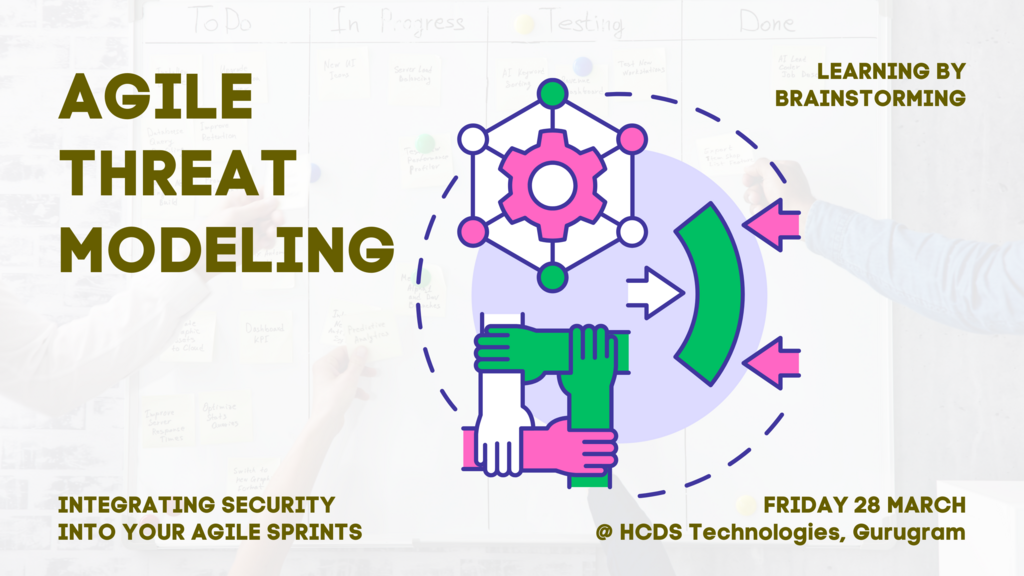
Meetup Agenda: Agile Threat Modeling - 2 Hours
Theme: Integrating Security into Your Agile Sprints
Welcome Participants: Developers, Testers, Product Owners, Security Enthusiasts
Duration: 2 Hours (9:00 AM to 11:00 AM)
Location: HCDS Technologies Gurugram
Goal: To provide a practical understanding of agile threat modeling and equip attendees with the skills to integrate it into their agile workflows.
Agenda:
(9:00 - 9:15) Welcome & Introductions (15 Minutes)
Welcome & Icebreaker (5 minutes):
Brief welcome message.
Quick round of introductions (name, role, experience with threat modeling/agile).
"What's one security question you've always wanted answered?" (Quick sharing).
Agenda Overview & Goals (5 minutes):
Outline the agenda and expected outcomes.
Emphasize the importance of agile threat modeling.
Setting the Stage: Agile & Security (5 minutes):
Brief discussion on the challenges of integrating security into agile.
Highlight the benefits of proactive threat modeling.
(9:15 - 9:45) Agile Threat Modeling Fundamentals (30 Minutes)
What is Threat Modeling? (10 minutes):
Definition and core concepts.
Explanation of common threat modeling methodologies (STRIDE, PASTA, etc.).
Why it matters in agile.
Integrating Threat Modeling into Agile (15 minutes):
How threat modeling fits into sprints and iterations.
Roles and responsibilities in agile threat modeling.
Practical examples of incorporating threat modeling into sprint planning, backlog refinement, and retrospectives.
Tools & Techniques Overview (5 minutes):
Brief introduction to common threat modeling tools (OWASP Threat Dragon, Microsoft Threat Modeling Tool).
Overview of data flow diagrams and attack trees.
(9:45 - 10:30) Practical Workshop: Threat Modeling a User Story (45 Minutes)
Scenario Introduction (5 minutes):
Present a simplified user story (e.g., "As a user, I want to be able to reset my password").
Explain the context and assumptions.
Group Formation (5 minutes):
Divide attendees into small groups (4-5 people).
Threat Modeling Activity (25 minutes):
Each group will perform a simplified threat modeling exercise using the provided user story.
Groups can use a simplified version of STRIDE or draw a simple data flow diagram.
Identify potential threats and vulnerabilities.
Discuss potential mitigation strategies.
Group Presentations & Discussion (10 minutes):
Each group briefly presents their findings.
Facilitated discussion on common threats and effective mitigation strategies.
(10:30 - 10:50) Automating & Scaling Agile Threat Modeling (20 Minutes)
Automation Opportunities (10 minutes):
Discuss how to automate parts of the threat modeling process (e.g., using security tools and integrations).
Examples of automated security testing and code analysis.
Scaling Threat Modeling (10 minutes):
Strategies for scaling threat modeling across multiple teams and projects.
Building a security-conscious culture.
Using threat libraries to speed up the process.
(10:50 - 11:00) Q&A, Wrap-up & Networking (10 Minutes)
Open Q&A (5 minutes):
Address any remaining questions from the audience.
Wrap-up & Key Takeaways (3 minutes):
Summarize the key learnings from the meetup.
Provide resources for further learning.
Networking (2 minutes):
Encourage attendees to connect and network.
Thank you and goodbye.